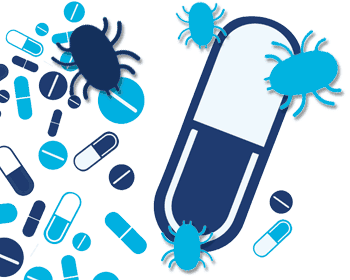Dot’s Dish #10: Antibiotic Resistance
By Dorothy Cook
As someone with a horrible immune system, I have had to take antibiotics many, many, many times. I’d known that antibiotic resistance was a thing, but I had no idea what impact antibiotic resistance is having on…like everything.
For starters, I’ll quickly go over what antibiotics are and how they work. Antibiotics are basically antimicrobial substances that stop bacteria. They stop bacteria either by killing them or stopping them from reproducing. Before we had antibiotics (the first antibiotic, penicillin, was discovered by Alexander Fleming in 1928), people would die from simple bacterial infections like strep throat, meningitis, and even simple skin infections.
Bacteria are smart. They can adapt and develop a resistance to the thing that’s trying to destroy them. Kind of like how the boss in a video game gets harder and harder to beat every time you pass a level. Say you have a cut on your finger, and that cut gets infected. You get some antibiotic ointment to put on it, hoping that it will help your finger. This antibiotic ointment does a really good job, but it leaves one little bacteria behind. That bacteria is resistant to the antibiotic you tried to kill it with. Now, he’s going to go and find all of his nasty little bacteria friends out in the world and share his secret with them: how to not die from this antibiotic. It’s a little more complicated than that, but if you want the nitty gritty information, you can go to https://www.cdc.gov/drugresistance/about/how-resistance-happens.html#:~:text=Bacteria%20develop%20resistance%20mechanisms%20by,make%20other%20germs%20become%20resistant.
So, these bacteria now all have the information they need to not get killed the next time someone uses that antibacterial ointment on a cut. This is why you should only use antibiotics when you absolutely need to. According to the CDC, “Of the estimated 154 million prescriptions for antibiotics written in doctor’s offices and emergency departments each year, 30 percent are unnecessary”. That is insane.
Here’s another insane thing about antibiotics that most people don’t know: an estimated 73% of all antibiotics worldwide are used in farms on animals, not in hospitals for people. This use in antibiotics in animals is directly related to antibiotic resistance in humans. Antibiotics in animals were originally meant to make the animals bigger and keep them healthier, which meant that farmers could keep animals in horrible conditions without worrying about the animals getting sick so often. Animals get fed antibiotics. People eat the animals that ate those antibiotics. People develop antibiotic resistance. Rinse and repeat for 100 years.
Now that we’re absolutely “experts” on antibiotics, how can we stop antibiotic resistance? Thank you for asking, I’ll tell you. For one, we can stop taking unnecessary antibiotics. We can also stop eating animal products that contain antibiotics. If you see “raised without antibiotics” on a package of steak, go for that one. One fancy thing that scientists are looking into is called phage therapy. Bacteriophages are the natural kryptonite of bacteria- they keep bacteria in check in nature. The hard part of using phage therapy is that phages are found in gross places like sewers and other places where bacteria run rampant, and the phages are super hard to match to bacteria. It’s like finding a needle in a haystack.
The next time you think about taking antibiotics, make sure it’s really necessary. Antibiotic resistance is making it harder to cure common bacterial infections, and we’re running out of antibiotics to give to people with resistance to other antibiotics. Bacterial infections can be deadly, and there are things you can do to stop the spread of antibiotic resistance to a life-saving wonder drug. Do them.
https://www.webmd.com/a-to-z-guides/what-are-antibiotics
https://www.cdc.gov/media/releases/2016/p0503-unnecessary-prescriptions.html



